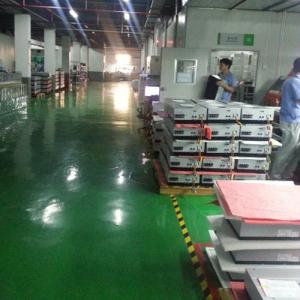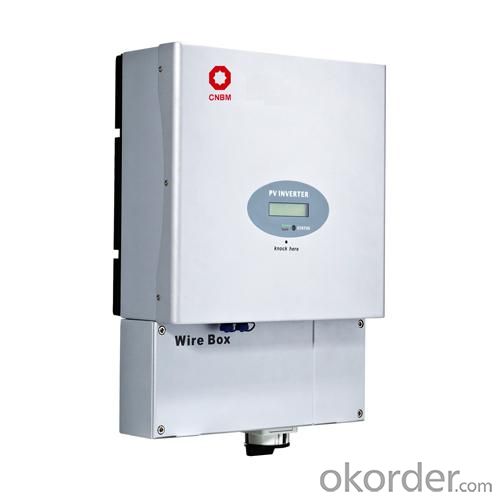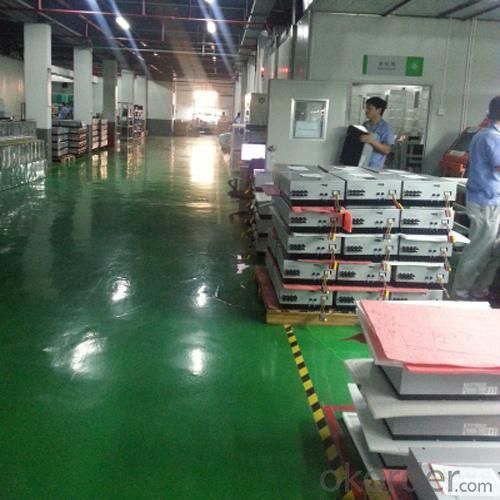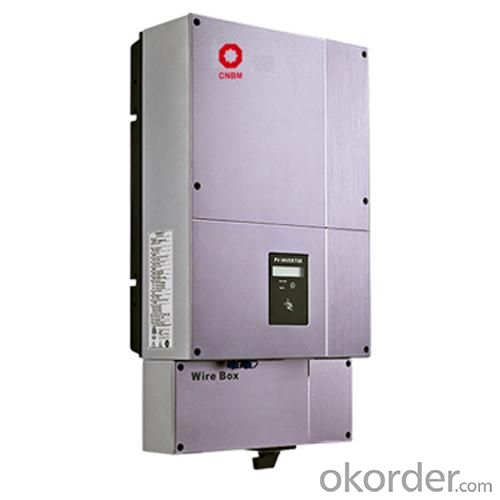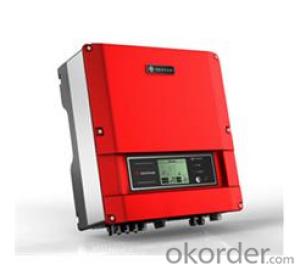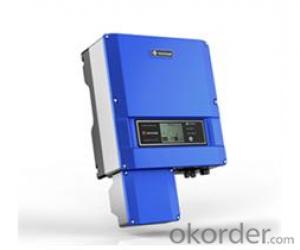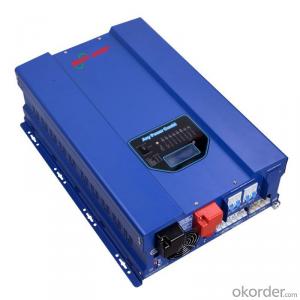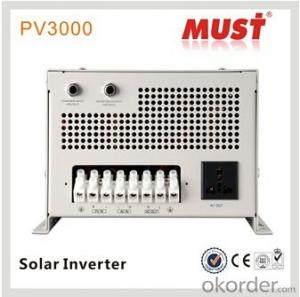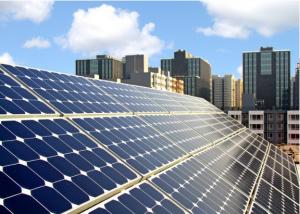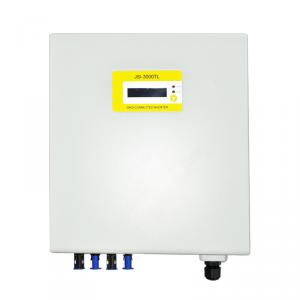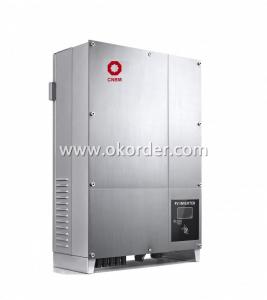Grid Tied Solar Inverter 3000W
- Loading Port:
- Shenzhen
- Payment Terms:
- TT
- Min Order Qty:
- 1 pc
- Supply Capability:
- 1-3000/month pc/month
OKorder Service Pledge
OKorder Financial Service
You Might Also Like
Short introduction of Grid Connected Solar Inverter 3000W
Maximum efficiency of 97.5% and wide input voltage range
Integrated DC switch-disconnected
MTL-String
Sound control
Bluetooth/RF technology /Wi-Fi
Transformerless GT topology
5 years warranty (10 years as optional)
Company introduction:
CNBM International Corporation (CNBM International) is the most important trading platform of CNBM Group Corporation, a state-owned company under the direct supervision of State-owned Assets Supervision and Administration Commission of the State Council.
With a R&D team more than 100 engineers,40% of the staff, who has been deeply engaged in the photovoltaic industry for 10 years, CNBM takes the mission to increase the inverter availability and efficiency, putting continuous innovation to make CNBM inverter easier for installation and operation, and more cost-effective for solar plant construction. The full range of CNBM single phase inverters has received VDE, CE, G83/1, G59/2, ENEL2010, VDE4105, C10/C11, AS4777 etc.
Maximum efficiency of 97.8% and wide input voltage range, Internal DCswitch,MTL-String, Sound control,Bluetooth/RF technology /Wi-FiTransformerless,GT topology
The Grid Connected Solar Inverter we can offer is 1.5kw to 20kw.
Datasheet of Grid Connected Solar Inverter 3000W
Model | CNBM-1500-US | CNBM-2000-US | CNBM-3000-US |
Input data |
| ||
Max. DC power | 1800W | 2300W | 3200W |
Max. DC voltage | 450V | 500V | 500V |
Start voltage | 150V | 150V | 150V |
PV voltage range | 100V-450V | 100V-500V | 100V-500V |
Number of MPP trackers/strings per MPP tracker | 1/1 | 1/2 | 1/2 |
Max. input current of the MPP tracker | 12A | 14A | 17A |
Output data |
| ||
Nominal AC output power | 1500W@208Vac 1650W@240&277Vac | 1800W@208Vac 2000W@240&277Vac | 2500W@208Vac 2800W@240&277Vac |
Max. output current | 8A/7.8A/6.8A | 9.7A/9.4A/8.2A | 15A/14.2A/12.3A |
AC nominal voltage; range | Default:240V single phase optional:208,240or277 single phase 183-228@208V 211-264V@240V 244-305@277V | ||
AC grid frequency; range | 60Hz;59.3-60.5Hz | 60Hz;59.3-60.5Hz | 60Hz;59.3-60.5Hz |
Phase shift (cosφ) | 1 | 1 | 1 |
THDI | <3% | <3% | <3% |
AC connection | Single phase | Single phase | Single phase |
Efficiency |
| ||
Max. efficiency | 97% | 97% | 97% |
CEC efficiency | 96% | 96.50% | 96.50% |
MPPT efficiency | 99.50% | 99.50% | 99.50% |
Protection devices |
| ||
Output overvoltage protection-varistor | yes | yes | yes |
Ground fault monitoring | yes | yes | yes |
Grid monitoring | yes | yes | yes |
General Data |
| ||
Dimensions (W / H / D) in mm | 360/465/165 | 360/465/165 | 360/465/165 |
Weight | 14.6KG | 15.1KG | 15.9KG |
Operating temperature range | -25...+60°C | -25...+60°C | -25...+60°C |
Altitude | Up to 2000m(6560ft) without power derating | ||
Consumption: operating(standby) / night | <5W / < 0.5 W | <5W / < 0.5 W | <5 W / < 0.5 W |
Topology | Transformerless | ||
Cooling concept | Natural | Natural | Natural |
Enclosure | Type 3R | Type 3R | Type 3R |
Features |
| ||
DC connection: | Screw terminal | Screw terminal | Screw terminal |
AC connection: | Screw terminal | Screw terminal | Screw terminal |
display | LCD | LCD | LCD |
Interfaces: RS485/RS232/Bluetooth/RF/Zigbee | yes/yes/opt/opt/opt | ||
Warranty: 5 years/ 10 years / 15 years | yes /opt | yes /opt | yes /opt |
Certificates and approvals | UL1741,UL1998 IEEE 1547, CSA C22.2 No.107.1-1,FCC Part15(Class A&B) | ||
Picture 1 Factory of Grid Connected Solar Inverter 3000W
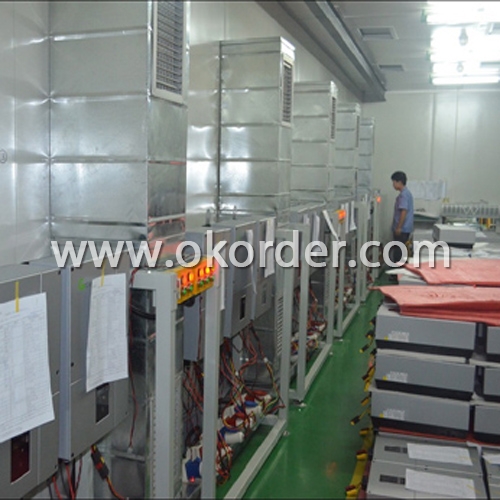
Picture 2 Package of Grid Connected Solar Inverter 3000W
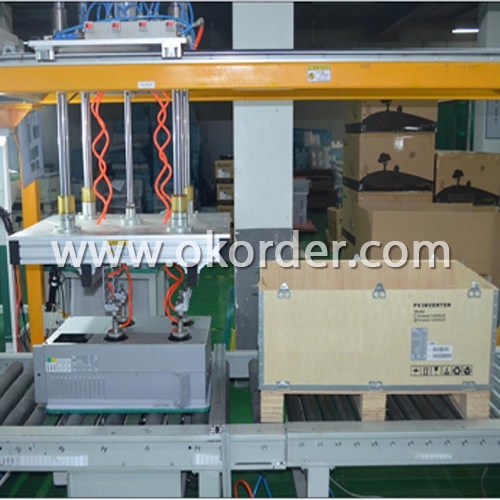
- Q: How do you connect a solar inverter to a data monitoring system?
- To connect a solar inverter to a data monitoring system, you need to follow a few steps. First, ensure that your solar inverter is compatible with a data monitoring system. Next, connect the inverter to a local network, either wired or wireless, depending on the available options. Then, configure the inverter's settings to enable data transmission. Finally, install the required software or app provided by the data monitoring system and use the provided instructions to link the inverter to the monitoring system.
- Q: How do you calculate the efficiency of a solar inverter?
- To calculate the efficiency of a solar inverter, you need to divide the output power by the input power and multiply the result by 100 to get a percentage. The formula is: Efficiency = (Output Power / Input Power) * 100.
- Q: Can a solar inverter be used in areas with unstable power grids?
- Yes, a solar inverter can be used in areas with unstable power grids. Solar inverters are designed to convert the direct current (DC) generated by solar panels into alternating current (AC) suitable for use in homes or businesses. In areas with unstable power grids, where there are frequent power outages or voltage fluctuations, solar inverters can provide a reliable source of electricity by switching to battery power during grid failures or regulating the voltage to protect sensitive equipment. Additionally, some advanced solar inverters have features like grid support functions or anti-islanding protection, which allow them to operate safely and effectively even in areas with unstable power grids.
- Q: What is the importance of overcurrent protection in a solar inverter?
- Several reasons highlight the significance of overcurrent protection in a solar inverter. Firstly, the conversion of direct current (DC) generated by solar panels into alternating current (AC) to power electrical devices is the responsibility of solar inverters. Throughout this conversion process, there is a potential risk of an overcurrent situation occurring, wherein the inverter surpasses its rated capacity. The consequences of such a scenario include overheating, damage to inverter components, and even fire hazards. Secondly, overcurrent protection is crucial for safeguarding the entire solar power system. By promptly detecting and interrupting excessive current flow, it prevents harm to solar panels, the inverter, and other connected electrical equipment. Additionally, it serves as a defense against electrical shocks and other potential hazards that may arise from an overcurrent situation. Furthermore, the maintenance of efficiency and performance in the solar inverter heavily relies on overcurrent protection. When an overcurrent event occurs, the inverter has the capability to shut down or reduce its output, effectively preventing further damage. This proactive approach ensures minimal downtime and guarantees the solar power system continues to function at its optimum capacity. Moreover, meeting regulatory and safety standards is another essential aspect of overcurrent protection. Various countries and regions have specific guidelines and requirements governing the installation and operation of solar power systems. Adhering to these standards is essential to ensure personnel safety, protect the environment, and mitigate any potential legal or financial liabilities. In conclusion, the safety, efficiency, and performance of the entire solar power system heavily rely on the presence of overcurrent protection in a solar inverter. It prevents damage to the inverter and other equipment, safeguards against hazards, and ensures compliance with regulatory standards. Consequently, implementing reliable and effective overcurrent protection mechanisms in solar inverters is imperative.
- Q: Can a solar inverter be used with different types of solar panels (monocrystalline, polycrystalline, thin-film)?
- Yes, a solar inverter can be used with different types of solar panels such as monocrystalline, polycrystalline, and thin-film. Solar inverters are designed to convert the direct current (DC) electricity generated by solar panels into alternating current (AC) electricity that can be used to power household appliances and feed into the grid. As long as the solar panel's output voltage and current fall within the operating range of the inverter, it can be used regardless of the panel type.
- Q: Can a solar inverter be used with a generator as a backup power source?
- Yes, a solar inverter can be used with a generator as a backup power source. The solar inverter can be connected to the generator's power output, allowing it to convert the generator's AC power into usable DC power for the solar panels. This enables the solar panels to continue generating electricity even when there is no sunlight, providing a reliable backup power supply.
- Q: Can a solar inverter be used with a ground-mounted solar panel system?
- Yes, a solar inverter can be used with a ground-mounted solar panel system. The solar inverter is responsible for converting the DC power generated by the solar panels into AC power that can be used to power household appliances or fed back into the electrical grid. Whether the solar panels are mounted on the ground or on a rooftop, the inverter plays a crucial role in ensuring the efficient and effective utilization of the solar energy generated.
- Q: Can a solar inverter be used with a solar-powered water purification system?
- Yes, a solar inverter can be used with a solar-powered water purification system. A solar inverter is responsible for converting the direct current (DC) electricity produced by solar panels into alternating current (AC) electricity that can be used to power various appliances and systems. In the case of a solar-powered water purification system, the solar inverter would be essential in converting the DC electricity generated by the solar panels into the appropriate AC power required to operate the system's pumps, filters, and other components.
- Q: What are the main components of a solar inverter?
- The main components of a solar inverter include the converter, control circuitry, filters, and the inverter output. The converter converts the direct current (DC) power generated by solar panels into alternating current (AC) power. The control circuitry regulates and manages the power conversion process. Filters ensure the output power is clean and free from any noise or interference. The inverter output delivers the AC power to the electrical grid or to power the connected devices.
- Q: What are the main components of a solar inverter system?
- Solar inverter systems consist of several key components, namely solar panels, the inverter itself, and various electrical elements. The primary component of a solar inverter system is the solar panel. These panels are composed of photovoltaic cells that transform sunlight into direct current (DC) electricity. To maximize exposure to sunlight, they are typically installed on rooftops or in open areas. Another crucial component is the inverter, which plays a vital role in converting the DC electricity produced by the solar panels into alternating current (AC) electricity, the type commonly used in homes and businesses. Inverters also regulate the electricity flow, ensuring it aligns with the voltage and frequency of the utility grid. In addition to the solar panels and inverter, other electrical components are present in a solar inverter system. These include wiring, switches, fuses, and circuit breakers, which facilitate the connection of the solar panels, inverter, and other equipment to the electrical grid. Monitoring systems and data loggers are often included as well, providing valuable information on energy production and system performance. Lastly, a solar inverter system may incorporate a battery storage system. This allows surplus electricity generated by the solar panels to be stored for later use, such as during periods of low sunlight or power outages. Battery storage systems are gaining popularity as they offer greater energy independence and the ability to utilize solar energy even when sunlight is scarce. In summary, the main constituents of a solar inverter system encompass solar panels, the inverter, electrical elements, and potentially a battery storage system. Each component has a crucial role in harnessing solar energy and converting it into usable electricity for residential and commercial purposes.
Send your message to us
Grid Tied Solar Inverter 3000W
- Loading Port:
- Shenzhen
- Payment Terms:
- TT
- Min Order Qty:
- 1 pc
- Supply Capability:
- 1-3000/month pc/month
OKorder Service Pledge
OKorder Financial Service
Similar products
Hot products
Hot Searches
Related keywords

